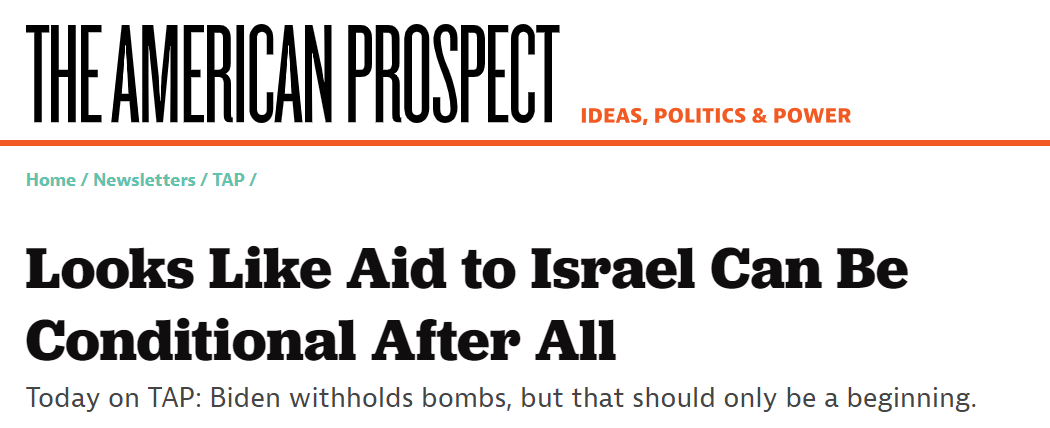Welcome to DU!
The truly grassroots left-of-center political community where regular people, not algorithms, drive the discussions and set the standards.
Join the community:
Create a free account
Support DU (and get rid of ads!):
Become a Star Member
Latest Breaking News
General Discussion
The DU Lounge
All Forums
Issue Forums
Culture Forums
Alliance Forums
Region Forums
Support Forums
Help & Search
General Discussion
Showing Original Post only (View all)Looks Like Aid to Israel Can Be Conditional After All [View all]

https://prospect.org/blogs-and-newsletters/tap/2024-05-09-aid-to-israel-conditional/

Displaced Palestinians arrive in central Gaza after fleeing from the southern Gaza city of Rafah in Deir al Balah, Gaza Strip, May 9, 2024.
President Biden’s better-late-than-never and better-partial-than-nothing-at-all decision to withhold U.S. bombs and shells from Israel should it mount an all-out attack on Rafah at least shows that his administration can have the ability to walk its talk. Biden’s talk has been replete with before-the-fact advice to the Netanyahu government not to utterly destroy Gaza in its war on Hamas, and after-the-fact statements of regret and condemnation as Israel has persisted in doing just that. Until the past couple of weeks, however, Biden didn’t really draw a line that he said Israel should not cross, and that line was Israel assaulting the million Palestinian refugees huddled in Rafah because there was no place left to go—at least, no place in Gaza where buildings still stood.
Until yesterday, Biden had acted as if drawing any lines that conditioned U.S. aid to Israel was without precedent, if not un-American. That ignored a host of precedents in which American presidents did just that, including Dwight Eisenhower’s order to Israel to cease its offensive against Egyptian forces at the Suez Canal, and Ronald Reagan’s order to Israel to stop its invasion of Lebanon. Those orders came down, moreover, when Israel’s government did not yet include fanatical, messianic bigots as its current cabinet does, and when the country’s prime minister was not determined to keep the war going as a way to forestall the fall of his government and his ensuing criminal prosecution on unrelated charges, which is certainly at the root of Bibi’s determination to keep the war going today. More broadly, however, the U.S. has conducted much of its Middle Eastern policy over the past two decades as if it were still dealing with an Israeli government headed by Yitzhak Rabin—the onetime Israeli general who, as prime minister, signed the Oslo Accords and began work on the two-state solution the accords set out.
Shortly after he’d embarked on that process, of course, Rabin was assassinated by an ultranationalist, and for most of the past two decades, such ultranationalists, represented disproportionately among the West Bank settlers, have set de facto Israeli policy, even when a majority of Israelis overall opposed them (as in the controversy over the powers of Israel’s Supreme Court). Desperate to cling to power rather than go to the clink, Bibi sought and won the ultras’ support in order to have a parliamentary majority, placing the most ultra of the ultras in his cabinet, where they’ve demanded the devastation of Gaza and backed anti-Palestinian pogroms in the West Bank. One might expect that the Biden administration might have reconsidered its position of unconditional aid to an Israel so governed. (That Donald Trump, when president, clearly favored the rise of ultranationalists in the Israeli government should have been a warning sign that a government so attractive to violent authoritarians might not fully merit our embrace.)
Now that Biden has finally found a line that Israel can cross only by forfeiting a measure of U.S. aid, however, there remain other lines that Israel crosses every day. We can still provide Israel with antimissile defenses (and we should) and at the same time withhold other aid so long as Israel continues to foster famine in Gaza and turns a blind eye to the rising settler violence against Palestinians in the West Bank. More broadly, since America’s baseline position in our Middle Eastern policy is support for a two-state solution, it’s hard to see why active adherence to such a policy, which Israel once pledged to support and which Bibi has officially rejected, should not be the chief condition on which our support for Israel is based. And not just lip-service adherence, but the active removal of Israeli settlements from the West Bank. The demands of both realpolitik and democratic values don’t often coincide, but they do come together, albeit with some jostling, in the two-state policy. If flouting such a policy isn’t grounds for withholding American aid, what on earth is?
snip
InfoView thread info, including edit history
TrashPut this thread in your Trash Can (My DU » Trash Can)
BookmarkAdd this thread to your Bookmarks (My DU » Bookmarks)
14 replies, 958 views
ShareGet links to this post and/or share on social media
AlertAlert this post for a rule violation
PowersThere are no powers you can use on this post
EditCannot edit other people's posts
ReplyReply to this post
EditCannot edit other people's posts
Rec (21)
ReplyReply to this post
14 replies
 = new reply since forum marked as read
Highlight:
NoneDon't highlight anything
5 newestHighlight 5 most recent replies
= new reply since forum marked as read
Highlight:
NoneDon't highlight anything
5 newestHighlight 5 most recent replies
In case they should impeach themselves considering how they postponed the aid package till the last minute anyways
ColinC
May 9
#8
Did you mean to reply to my OP? It was the other poster who brought impeachment up.
Celerity
May 9
#4
Yes. I replied to your post before the previous poster did, but it took me longer to write a reply.
LeftInTX
May 9
#5
The WSJ article is comparing extorting an ally with aid to withholding aid over misusing it. 🤔
ColinC
May 9
#9